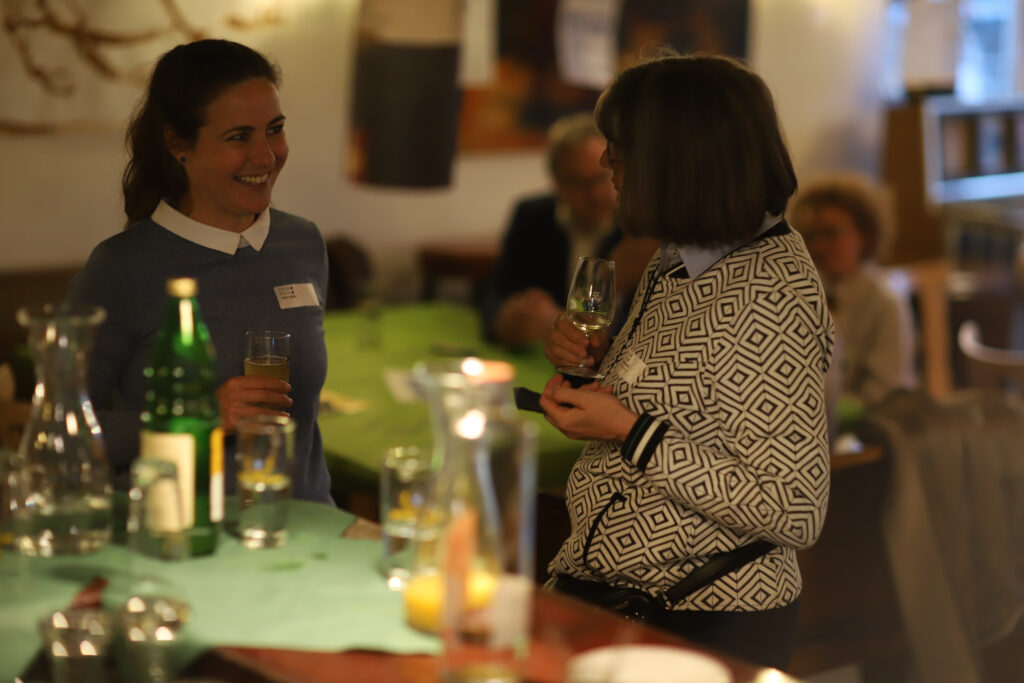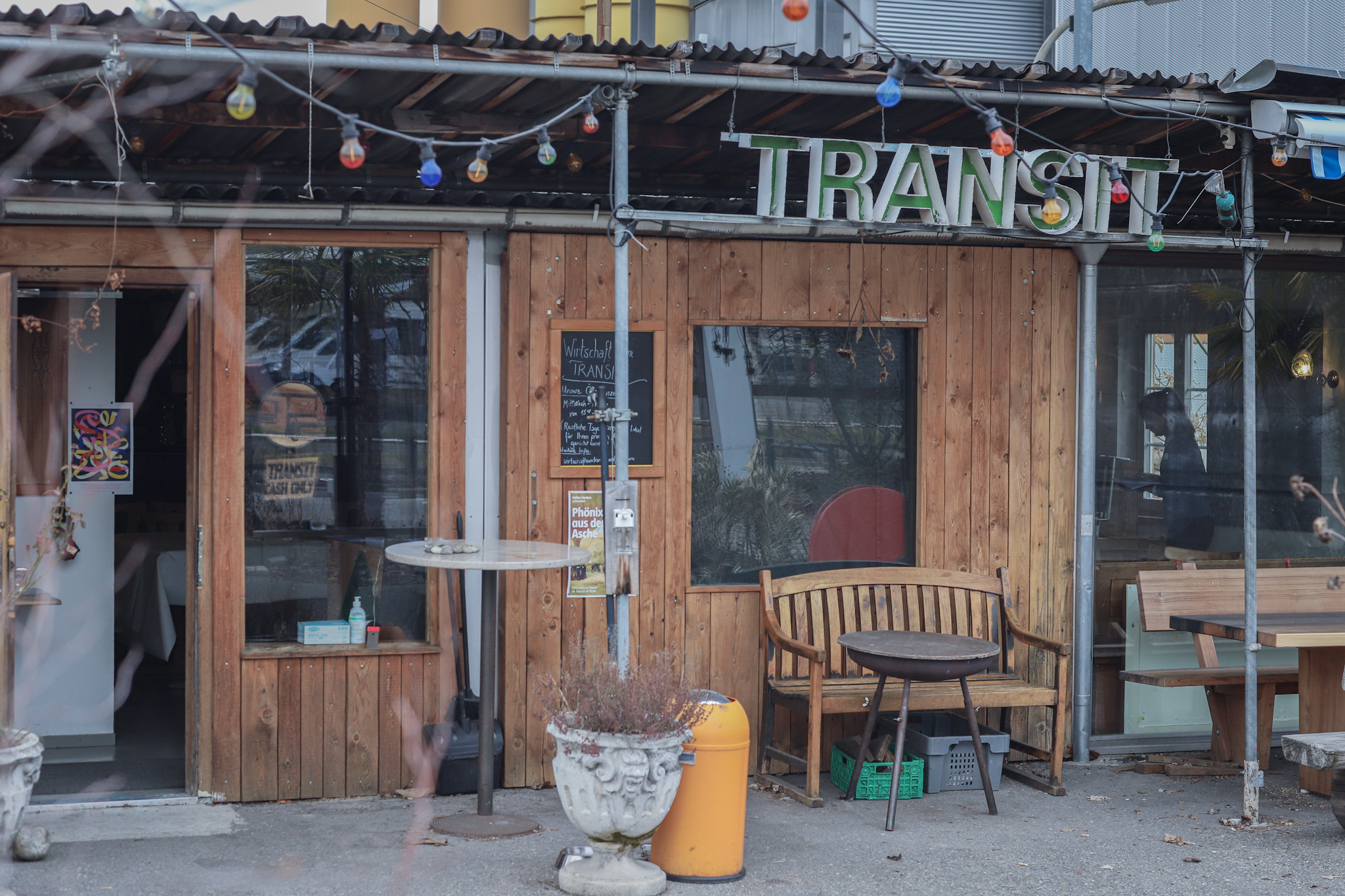The TRANSIT think tank has been focusing on the topic of flexibilisation for more than a year. Together with experts, we have produced the third trend report. As a conclusion to the topic, the TRANSIT think tank publicly invited to the salon “Flexibilisation: Perspectives for Adult Learning”. The event took place on 7 March 2023 at the Wirtschaft zum Transit in Zurich.
In the salon, participants had the opportunity to discuss and reflect on perspectives and questions on the topic of flexibilisation with a view to their own practice. They were able to reflect on developments, discuss challenges and opportunities, and look for examples of “best practice”. In addition, the event offered the opportunity to network and exchange ideas.
Coming together in TRANSIT
The TRANSIT think tank got its name due to its basic idea: it is to create a mental free space where shifts in boundaries, contradictions of the current situation and common approaches to solutions can be discussed. With the “Wirtschaft zum Transit” we have found a place in Zurich Altstetten that – in a different context – operates with similar ideas. A food stall in a Ford Transit has become a restaurant that the owners run with creative means. The inspiring ambiance allows us to give free rein to our ideas and thoughts.
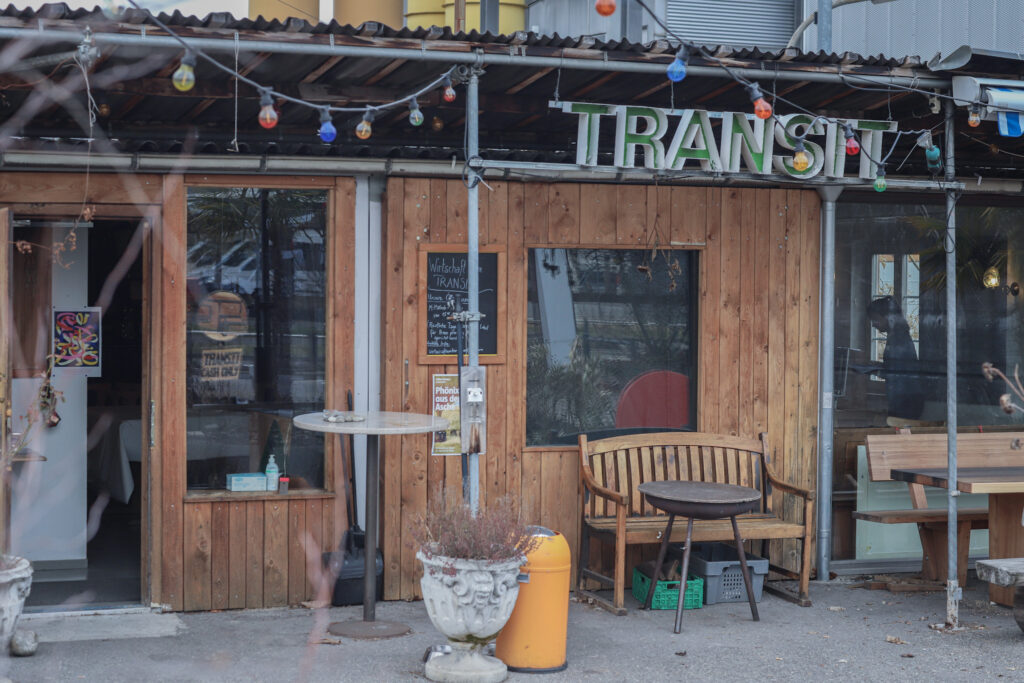
The trend report: basis for the discussions
Helen Buchs, Co-Director of TRANSIT, presents the central points of the third trend report. First, she outlines core social developments in the areas of “life courses”, “world of work” and “sources of knowledge”. These are largely based on a shift towards post-materialistic values such as individualisation, self-determination or meaningfulness. The speaker then derives three overarching perspectives for adult learning. These are “plurality and diversity”, “meaningfulness and participation” and “complexity”. The presentation hence creates a common understanding for the subsequent discussions where we work with these perspectives.
The three perspectives not only stimulate reflection on opportunities and challenges, but they are also tangential to the current and future practice of adult learning. Accordingly, in group discussions we dedicate ourselves to the implementation of the perspectives in practice and exchange ideas about opportunities that arise as well as expected difficulties.
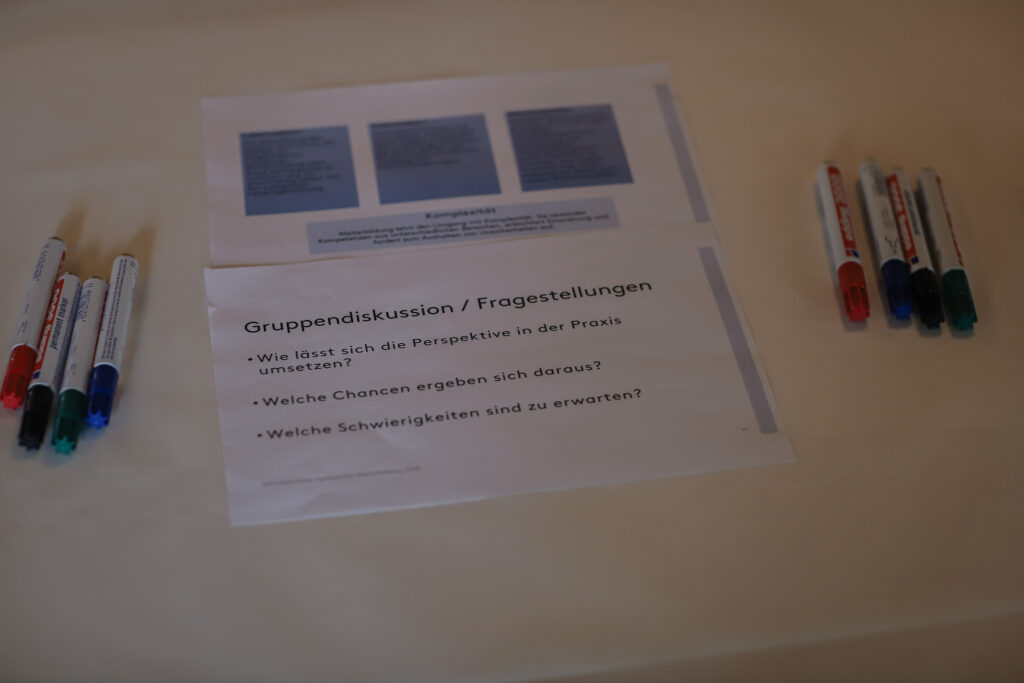
Discussion 1: World Café on Plurality and Diversity
In a world café – a workshop method – the participants learn about, question and discuss different perspectives on the topic of plurality and diversity from each other. Diversity seems to be a concern for all participants. In principle, they see many opportunities in taking plurality and diversity into account more consequently.
However, many also point out that the concrete implementation poses challenges. In the labour market, for example, diversity is often not very pronounced. Labour market-related adult learning has little influence on this and is sometimes confronted with homogeneous groups of participants. Furthermore, with increasing plurality and diversity in adult learning, it could become more difficult to convey common learning content.
Some participants see great potential in admission procedures for continuing education. If fewer exams or certificates were required and the focus was increasingly on people and their competences, diversity could be increased to the benefit of groups and lifestyles that continuing education often still excludes until today.
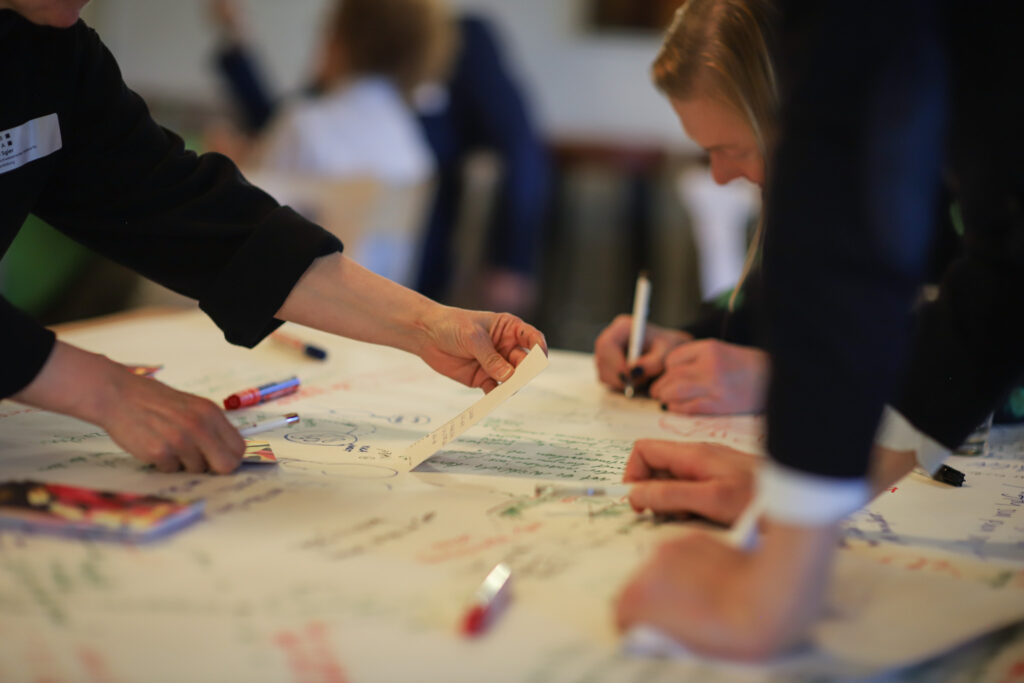
Discussion 2: Mini-Fishbowl on Meaningfulness and Participation
For the mini fishbowl, we place two chairs in the middle of a semicircle, one for the opportunities and one for the challenges of meaningfulness and participation. Whoever sits on them can represent the respective positions. In the lively discussions it becomes clear that meaningfulness and participation inflict about as many opportunities as challenges for the future practice of adult learning. Some participants vehemently represent one or the other point of view and accordingly settle down in the same chair again and again. Other participants, identify both opportunities and challenges.
The participants in particular mention the following opportunities: Increased proximity to the needs of the learners, the strengthening of confidence in one’s own perception, an empowerment of the learners and the awakening of interests. Many discussants agree with one speaker’s idea that participation is to create orientation and thus curates meaning.
On the other side, concerns arise about the practicability of meaningfulness and participation, because their implementation is very time-consuming, cost-intensive and often not compatible with the narrow objectives of some courses. In contrast to empowerment, according to a consensus among the participants, the focus on meaningfulness and participation also carries the risk of excluding people. In everyday life or at the workplace, many societal groups can hardly be creative or search for meaning and are therefore not addressed by these perspectives.
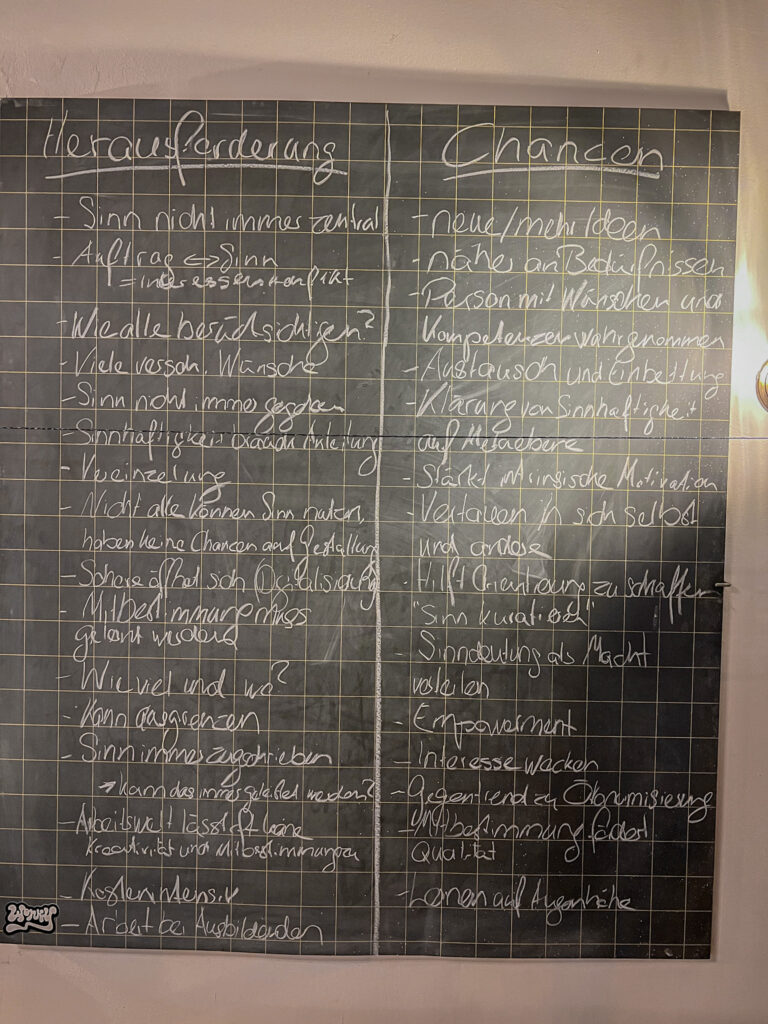
Discussion 3: Silent discussion about complexity
Exciting conversations can also succeed without words. In a silent discussion, participants write and sketch their ideas and arguments on the perspective of complexity. Our large tablecloth, stretched over several tables, is quickly filled with writing and drawings. The votes suggest that dealing with complexity and reducing it in the practice of adult learning is not an easy undertaking. Many comments are in turn commented on several times. Arrows between several messages illustrate the entanglements between the various opportunities and challenges.
According to the participants, complexity offers the chance for taking a more nuanced perspective and leaves room for individual interpretation and learning patterns. It challenges us to think further and to recognise connections, which seems particularly important in a world marked by flexibilisation.
However, complexity can also overtax. If teachers do not succeed in reducing complexity, the overload can lead to the exclusion of learners who cannot cope well with complexity. Participants also note that complexity reduction is often necessary to create a common understanding. However, some also warn of the pitfalls of under-complexity and advocate enduring complexity rather than reducing it.
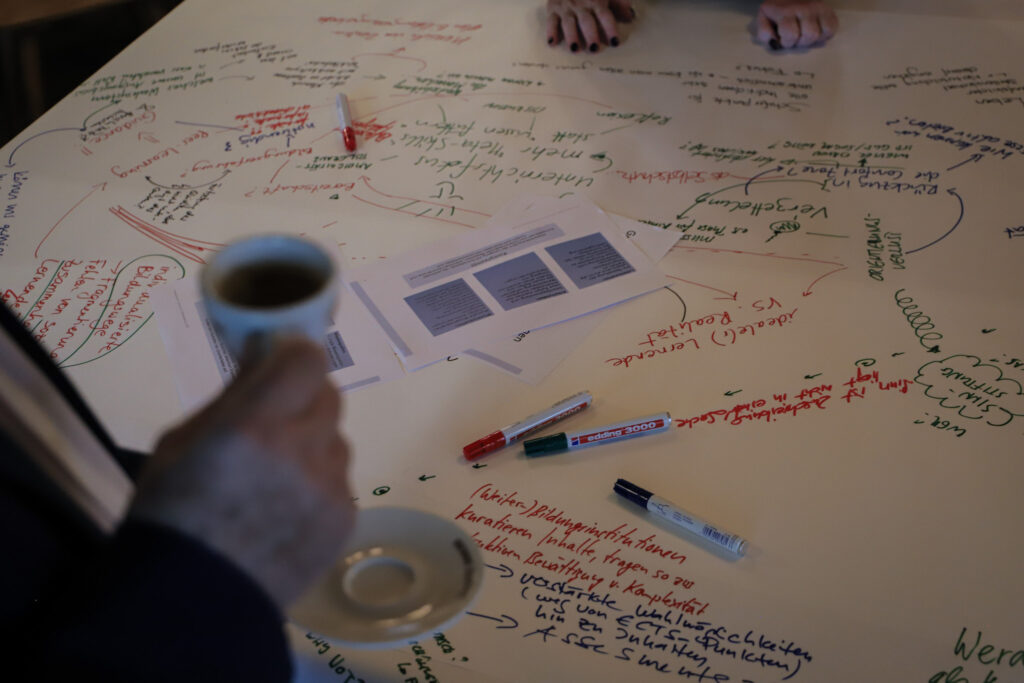
Greetings and networking at the aperitive
The salon should not only consist of “work” such as presentations and discussion rounds. Informal exchange and networking are also important. Finally, we will round off the evening with a delicious and rich aperitif. Several groups lively discuss about the future of adult learning. Contact details are exchanged.
For keeping the inspiration up, the participants write postcards designed by TRANSIT to other salon participants. The TRANSIT team thanks all participants for the exciting evening.
